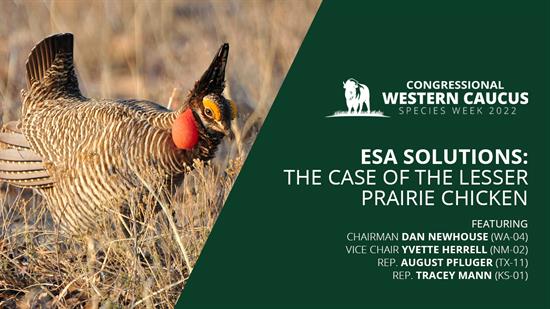Western Caucus Members Lead Forum to Highlight State & Local Collaboration on Lesser Prairie Chicken Recovery"ESA Solutions: The Case of the Lesser Prairie Chicken"
Washington,
July 26, 2022
|
Elizabeth Daniels
(202-280-8720)
WASHINGTON, D.C. – Chairman Dan Newhouse (WA-04), Vice Chair Yvette Herrell (NM-02), and Reps. August Pfluger (TX-11) and Tracey Mann (KS-01) recently hosted a Congressional Western Caucus Species Week virtual forum titled, “ESA Solutions: The Case of the Lesser Prairie Chicken.” The forum featured local leaders from New Mexico, Texas, and Kansas who discussed the ongoing state and local species conservation efforts to protect and restore habitat for the lesser prairie chicken.
“Western Caucus Members understand that states and local communities are best equipped to manage species,” said Chairman Newhouse. “These efforts on the ground in New Mexico, Texas, and Kansas illustrate exactly how we should be working to protect our threatened and endangered species – without burdensome regulations from the federal government. I am proud to work with Representatives Herrell, Pfluger, and Mann to highlight the important recovery efforts taking place in their districts, and I look forward to continuing to work with them to promote commonsense improvements to the Endangered Species Act.” “Voluntary, private conservation should be the foundation of preventing the listing of any at-risk species,” said Vice Chair Herrell. “In New Mexico, privately run, voluntary conservation projects have been extremely effective in conserving and protecting habitat for the Lesser Prairie Chicken (LPC). I am grateful that the Western Caucus gave communities impacted by the presence of the LPC the opportunity to highlight this work. I look forward to working with the Caucus to reform the Endangered Species Act to help all of our constituents.” “There is no doubt that the original purpose of the Endangered Species Act (ESA) has been distorted and misused in its application over the years," said Rep. Pfluger. "The Administration has ignored successful local and state conservation efforts and proposed re-listing the Lesser Prairie Chicken to curb oil and gas exploration and development in the Permian Basin, the most prolific oil and gas producing region in the U.S. We must modernize the ESA to prevent this important legislation from being used as a weapon against our agriculture and energy industries. We can protect important species without devastating our local and rural economies.” “Farmers, ranchers, and agricultural producers are the original conservationists and are the best stewards of their land and resources,” said Rep. Mann. “For example, when the recent drought caused the lesser prairie chicken population to decrease, Kansas producers voluntarily conserved more than 40,000 acres of habitat, bringing the population up to more than 34,400 birds. Any official that says otherwise goes against years of work, millions of dollars invested, and clear data that shows the population increased under those efforts. My Western Caucus colleagues and I are committed to removing federal red-tape that hinders the abilities of agricultural producers to do their jobs, and we will work to bring commonsense conservation strategies to the table.” The Biden Administration is proposing to list the lesser prairie chicken, a bird native to the Great Plains, as endangered under the Endangered Species Act (ESA). This action would jeopardize current state and locally-led species restoration efforts as well as the economic viability of conservation, energy production, and agriculture throughout the region. The Members heard from three participants during the forum who highlighted the impacts an ESA listing of the lesser prairie chicken would have on their industries as well as the active conservation efforts they are conducting to protect the species without interference or mandates from the federal government:
Background: Throughout the second annual Congressional Western Caucus Species Week, Members are highlighting solutions to promote commonsense Endangered Species Act (ESA) reforms needed to effectively recover species and allow rural communities to thrive. These solutions are based on three pillars of recovery: Transparency, Flexibility, and Scientific Credibility. Click here to learn more about Species Week. |
Stay Connected
Use the following link to sign up for our newsletter and get the latest news and updates directly to your inbox.


